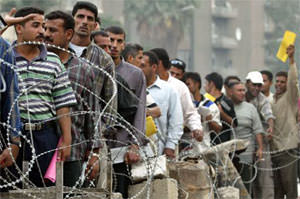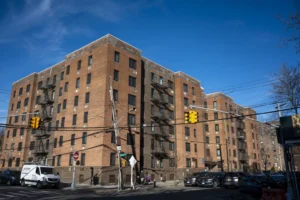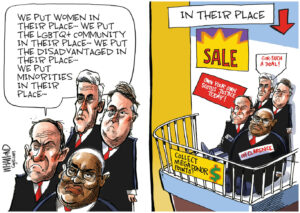The Second Insurgency
Many Iraqis struggle every day to find work, but a shortage of jobs, superimposed on a tradition of using personal connections to do business, has led to what Iraqis complain is an explosion in corruption and graft among their nation's officials.
BAGHDAD — Every morning for a year and a half, Tariq Razzaq has been coming to the decrepit entrance of a neighborhood maintenance office in southern Baghdad with a single goal in mind: to get a job. Every morning, the office employees turn him down.
It’s not that Razzaq, a 29-year-old former soldier in Saddam Hussein’s army, isn’t willing to do the lowest-paid manual labor: On a rare good day, the maintenance office asks Razzaq to perform one-time jobs cleaning trash and war debris out of gutters. It’s that he doesn’t have the money to bribe his way into a job.
“It’s simple: To find a steady job you need to have connections, or pay cash,” explains Razzaq, who spends most days with a group of other unemployed men loitering in the shadow of the maintenance office parking lot, hoping that someone will ask him to pump up his tires or wash his car. The other unemployed Iraqis nod emphatically in agreement.
By the end of this year, Iraq could have a $79-billion budget surplus, according to the U.S. Government Accountability Office. This sudden influx of petrodollars coincides with a dramatic decrease in violence, creating perfect conditions for Iraq to rebuild its war-ravaged infrastructure, health-care and education systems. But the government has spent only a fraction of its budget, and that means that in addition to an excruciatingly slow pace of rebuilding Iraq, job creation has been minimal. As many as half of all adult Iraqis are unemployed, economists here and in the U.S. estimate, making employment one of the highest-valued commodities in Iraq, on par with electricity and running water.
This shortage of jobs, superimposed on a tradition of using personal connections to do business, has led to what Iraqis complain is an explosion in corruption and graft among their nation’s officials. Corruption is so widespread that the U.S. inspector general for Iraq reconstruction, Stuart Bowen, called it the “second insurgency” in a recent interview with Cox newspapers.
“If you don’t have money to pay bribes, you can’t get a job,” says Ahmed Ahmed, 24, who has not been able to find a steady work since he graduated from Baghdad Technological College with a degree in mechanical engineering two years ago.
“I’d drive a garbage truck; I’d do anything,” says Ahmed, who gets by washing cars and changing flat tires and makes about $3 a day. He has to rely on his father, a government contractor who makes about $250 a month, to pay his monthly rent of $150 for his one-room apartment.
Iraqi officials here say they are aware of corruption and extortion — particularly when it comes to finding jobs in Iraq’s fledgling security forces, which pay more than $500 a month. Iraqi police Capt. Ali al-Shimeri, for example, recently said that recruits paying bribes or using family connections to join the police is “the reality.”
“I’ve heard that it’s very hard to get hired in security forces here in Baghdad,” says Lt. Col. Johnnie Johnson, who commands the 4-64 Infantry Battalion of the 4th Brigade, 3rd Infantry Division, which patrols a section of the Rashid district in southern Baghdad. “The system of hiring and betting is not very good right now in Iraq.”
Extortion by officials does not stop at the hiring process, Iraqis say. Some Iraqi contractors complain that they have to pay staggering bribes to officials on various levels — from local police patrolmen to high-ranking ministry officials — in order to complete projects for which they were hired by American forces.
“I need to pay two or three bribes for each project,” says Muthana Ghazi, 29, an engineer and translator who works for the Jasmine Flower for General Contracts, an Iraqi company that U.S. military has hired to do several projects in Baghdad’s Dora neighborhood. “If it’s a school, to the Ministry of Education. If it’s a clinic, to the Ministry of Health. If I don’t pay, they will write a bad report for what I did and not accept my final product.
“The first question they ask when you tell them you’re working on a project is how much your project is worth,” he said.
For example, when he did a $143,000 project to refurbish a local library, he had to pay $18,000 in bribes to various Iraqi officials, Ghazi said.
Such widespread corruption creates a threat that sectarian militias can bribe their way into Iraqi ministries and Iraqi security forces — or bribe them to look the other way, said one U.S. Army translator, who asked that his name not be used because he was not authorized to speak on the record.
“If police officers take bribes from recruits,” said the translator, “what will stop them from taking bribes from insurgents who want to place a bomb?”
Your support matters…Independent journalism is under threat and overshadowed by heavily funded mainstream media.
You can help level the playing field. Become a member.
Your tax-deductible contribution keeps us digging beneath the headlines to give you thought-provoking, investigative reporting and analysis that unearths what's really happening- without compromise.
Give today to support our courageous, independent journalists.






You need to be a supporter to comment.
There are currently no responses to this article.
Be the first to respond.